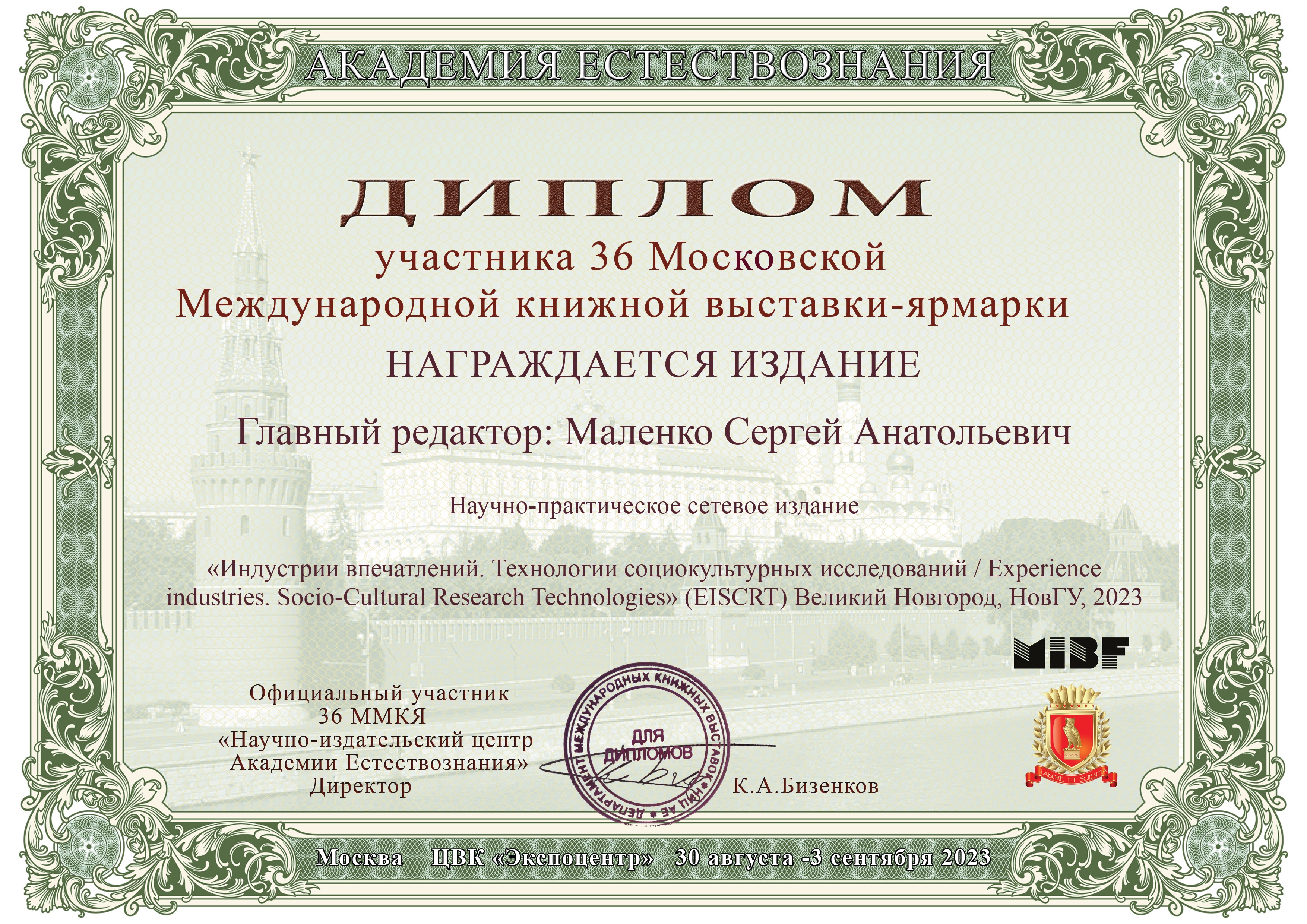THE POLES OF THE EXPERIENCE INDUSTRY: FROM THE ENTERTAINING LEISURE TO THE IDEOLOGEME OF "DEHUMANIZATION"
DOI:
https://doi.org/10.34680/EISCRT-2023-1(2)-09-21Abstract
Dear readers! Today we bring to your attention the second issue of our new publishing project: the electronic online journal «Индустрии впечатлений. Технологии социокультурных исследований / Experience industries. Socio-Cultural Research Technologies» (EISCRT). It is significant that literally immediately after its establishment, the magazine became a notable scientific and media phenomenon. Speaking on February 8 with congratulations to the Novgorod scientists on the occasion of the Day of Russian Science, the Governor of the Novgorod region Andrey Nikitin specifically noted the fact that «in December 2022, the first issue of a new scientific journal of NovSU – ”Experience industries. Socio-Cultural Research Technologies”» [Nikitin. Cit. by: Kuzmina 2023]. The thematic focus of the new edition is initially focused on the interdisciplinary study of subjective fictions and the spectrum of their emotional presentations. They traditionally unfold in the logic of mythological thinking, creating, as we already noted in the last issue of the magazine, a parallel socially and culturally significant communication space, which, in fact, allows us to understand the specifics of modern man and the peculiarities of his being. The issue opens with the work by our Krasnodar colleagues from Kuban State University – Veronika Katermina and Anna Gnedash. The authors present a research devoted to the study of one of the brightest phenomena of mass culture – sports fan online discourse. Relying on the analysis of the three most popular online football communities, the authors try to determine the culturally significant concepts of football fans' communication. At the same time, it turns out that emotionally charged football communities tend to form as mono-gender male communities, presenting themselves as invincible, prestigious winners. Moreover, modern fan discourse, according to colleagues, is fully consistent with the ideological formula: “Football is a man's war”. The phenomenon of success becomes the subject of scientific reflection by Sofya Tarasova, a senior researcher at the Psychological Institute of the Russian Academy of Education (Moscow). On the materials of research conducted by the author in a number of elite Moscow schools, the phenomenon of anxiety and aggressiveness of adolescents is studied. Having discovered the adaptive and maladaptive perfectionism of adolescents, considered from the standpoint of the philosophy of consumption, the author concludes that external success in the adolescent environment hides significant risks of suicide, leads to increased anxiety, hostility and anger, which, as a result, leaves a significant imprint on both the worldview and life expectations of schoolchildren, and in the future has a significant impact on their subsequent adult life. The column "Traditions" opens with an article by Yulia Kondakova. Our colleague from the Ural State University of Architecture and Art wonders about the role of the mask as a means of fashionable presentation of cultural meanings. The modern mask, according to the author, is becoming a full-fledged symbol of culture today, since it is not only an object of decoration, but is already turning into a means of protection, into a fashionable and even a utilitarian object. Irina Krasova, a post-graduate student of the Department of Philosophy of Donetsk National University, suggests reflecting on the potential of the fairy tale therapy method, which is actively used to decipher the coded symbols with which fairy tales are literally overflowing. The significance of such a procedure is determined by the correspondence of archetypal fairy tale images with the inner experience of each individual and the formation of their characteristic emotional worldview. The civic sacredness of childhood in the post-war Soviet cinema becomes the subject of scientific analysis by Sergei Malenko and Andrey Nekita. Cinematography was originally formed precisely as a “factory of impressions”, therefore, using it as a tool for visualizing the specific mythology of the Soviet person becomes an unusually effective tool, both artistically and politically and ideologically. And the theme of childhood turns into a classic example of the visualization of the Soviet hero as a fundamentally new type of heroism and the heroic. Oleg Shevchenko, Doctor of Philosophy, representing V. I. Vernadsky Crimean Federal University, continuing to analyze the significance of the Soviet heritage, turns to the consideration of shock content in the satirical and laughter chronotope of the Yalta conference. This is acquiring a special role today in the light of the sharp intensification of hybrid information wars. The intentional creation of distorted images of the role of the Yalta Peace in the creation of the post-war world order can be successfully used to form a domestic shock-content base of the new world order, allowing our country to adequately and comprehensively respond to the most acute challenges of our time. Postgraduate student of the Department of Philosophy, Cultural Studies and Sociology of Yaroslav the Wise Novgorod State University Dmitry Losev continues to reflect on the role of the film industry in shaping the image of the Superman in American comics. The author establishes that the images of Superheroes correspond to the tradition of the mythology of violence and in the conditions of modern mass culture turn into a significant element of "soft power". His colleague, graduate student Ilya Syuzyumov, analyzes the mythology of the future in Hollywood dystopian films of the early 21st century. Film images created in this genre have an unusual and stable consumer popularity, especially among the younger generation. This makes it possible to unobtrusively introduce meaningful political and ideological meanings into the minds of ordinary people, which unconsciously consolidate feelings of fear, anxiety and uncertainty about the future as the basic existential values for entire generations of the mass viewing audience. Olga Moskvitina, senior researcher at the Psychological Institute of the Russian Academy of Education, presents the results of research on the influence of virtual, digital reality on the formation of an individual's worldview. She argues that the dominance of digital images and tools, which is typical for today, leads to significant distortions of a person’s traditional ideas about himself and his place in society, become the cause of social division and disunity, and ultimately the “dehumanization” of people. The editorial Board of the journal «Индустрии впечатлений. Технологии социокультурных исследований / Experience industries. Socio-Cultural Research Technologies» (EISCRT) would like to thank all the authors for creating an original problem field and a space for research reflection on the past, present and future of the experience industry!
In our new issues, we are waiting for original ideas and creative innovations of researchers in the field of social and human sciences, philosophy, cultural studies, media, sociology, pedagogy and economics of culture, art history, design, cultural and art figures, organizers of production and presentation of impressions, theorists and practitioners in the field of cultural and creative industries. We cordially invite all interested specialists to an interested dialogue and productive exchange of opinions on the pages of our publication.
For article citations: Malenko, S. A. (2023). The Poles of the Experience Industry: From the Entertaining Leisure to the Ideologeme of "dehumanization". Experience industries. Socio-Cultural Research Technologies (EISCRT), 1 (2), 09–21. https://doi.org/10.34680/EISCRT-2023-1(2)-09-21








